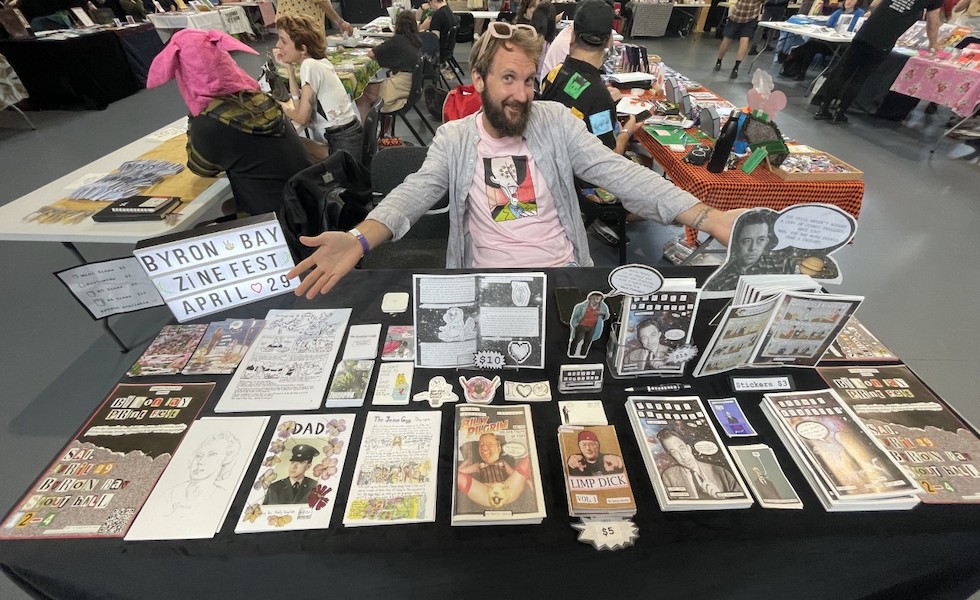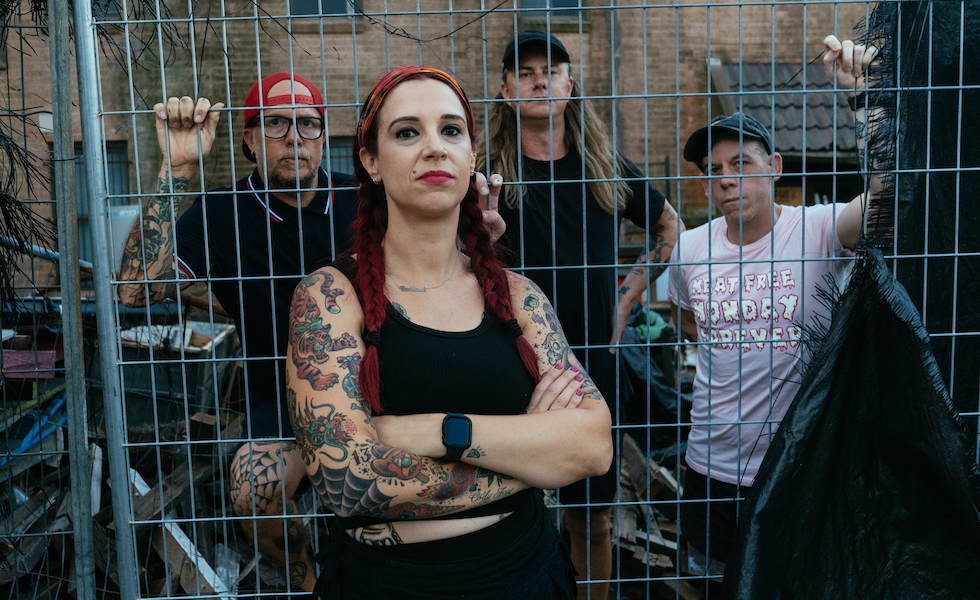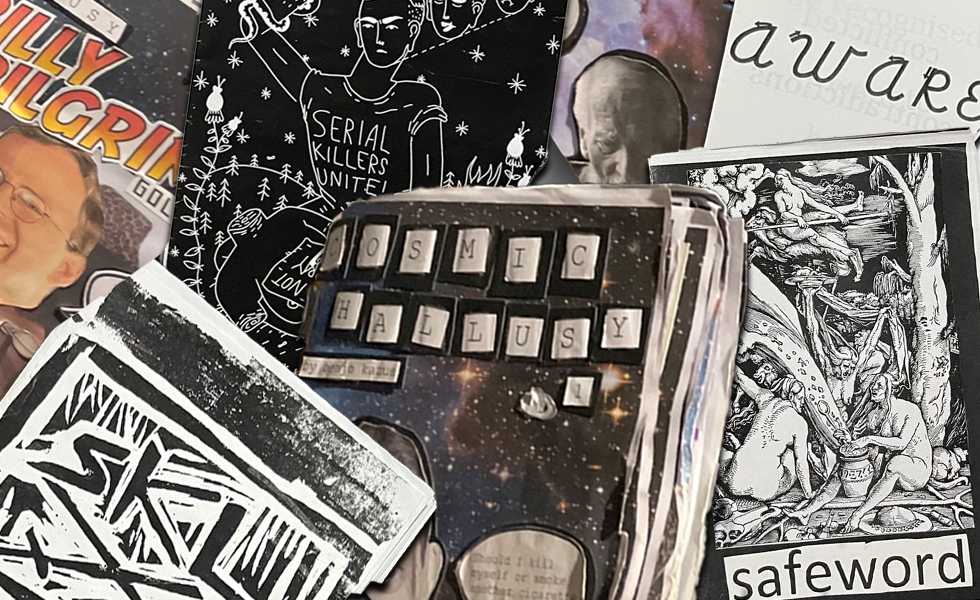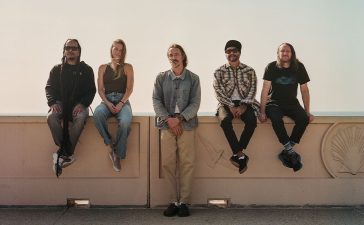Social media is no longer a tool for bands, it’s a trap.
It wasn’t always like this, as zinester and Byron Bay Print Fest organiser Benjo Kazue can attest to. “As a millennial, it was really cool to have social media. You had all this freedom of expression, you could find an identity,” and in the case of artists, an audience.
But the jig is up. Social media has become an essential duty for bands, leaving them spending more time plowing the fields of their digital feudal overlords than anything else required of artists, yet even loyal users are rewarded with diminishing returns. Once you sign up, you sign a pact with the algorithm to forever service its whims, lest your reach declines. Funds normally reserved for recording and merch now go towards social media campaigns that more often than not fall into the void.
“It’s just become another advertising or marketing channel. I think kids are onto that,” Kazue says.
But there’s one medium that could be a way forward, one that’s more effective than ever despite how far we pushed it into the underground: zines.
A zine is essentially a self-published story on paper, any story. It was a medium popular before mass access to digital audiences, and as the Great Unpluggening looms, it’s rearing its head once more. Existing on both sides of the great digital divide, Kazue understands the calculus behind this.

“It takes it back to these punk ideals of, ‘I’m going to put stuff out there that I’m not seeing.’ That’s what’s so interesting about zines. You can just create a space that doesn’t exist. All you need is paper and a pen, really. The possibilities are so endless to what defines a zine. It really doesn’t have to be sensical. You don’t have the colour between the lines, no one’s telling you what to make or how to make it. It’s just your imagination going wild.”
This is something that Sydney hardcore band Backhand can speak to. The group have announced their own forthcoming zine that will act as a platform for Australia’s hardcore and punk communities. “For us zines never really went away,” vocalist Kristy tells BLUNT. “Both [bassist] Jay and [guitarist] Macca are zine makers and have published for years.”
“The zine we’re working on is a collaboration between female, non-binary and non-cis male-fronted bands from Australia, where each band contributes a page. It also features a cassette compilation that I’ve been working on. It features a stack of Australian hardcore and punk acts.”
The elephant in the room is the environmental impacts.
All stages of zine production can be harmful to the environment from the paper, to the ink and binding, to the impacts of physical distribution and the high probability they’ll end up as landfill. There’s no easy solution to this and Kazue admits the conversation around climate change within the zine community is lagging, just like in many communities – but momentum has begun.
“For myself, it’s having that more expensive option of doing things ethically by sourcing recycled paper,” Kazue explains. “I know a lot of people who make their own paper, or they will go above and beyond. I know a lot of people who will stitch their zines at home or will make one master copy and then photocopy as cheap and as best they can without giving corporations more money.”
“There’s one cartooner from Byron Bay who’ll donate some profits. Whatever she makes is put back into the environment, or animal welfare, or the local community she’s taking from to create her work.”

Backhand are giving back to the greater cause in their own way: “We always take run size into account,” they explain. “Jay always says this saying that he learnt as a kid, ‘It’s a shame that for man to show his skill, must from Mother Nature, make his kill.’ It’s tricky though, of course it would be great to exclusively use recycled papers and ethical inks but as zine makers will tell you, sometimes when you’re scamming free photocopying for your work you can’t be picky.”
“We should even be making a lot of zines on this topic and putting them out for free,” Kazue adds. “‘You want to make a zine? This is how you can do it ethically.’ That would be a great way to educate zinesters or potential zinesters on how to get into the most environmentally friendly practices.”
There are gardening-focused zines with seeds woven into their pages, showing progress with improving the waste factor, but the zine community doesn’t shy away from not having all the answers – rather it seeks new minds and voices to help solve for them.
With the means to be produced ethically and a newfound and rising respect for the craft, there’s a strong argument to be made that now is the best time to get into zines, even if you’re not in a band. Kazue can speak to the changing attitudes of the greater literary world. “I went through the academic institutions where you have to fight for legitimacy doing anything underground. But now it’s like self-publishing is a buzzword.”
As well as the Byron Print Festival, we also have the Brisbane Writers Festival, Queensland Poetry Festival and other high profile literature events all devoting time and energy towards zines. “It’s moved through this zeitgeist,” Kazue observes. “I think it’s a good time to be a zine maker. You’re still the alternative to the mainstream, but now you don’t have to fight as much for legitimacy.”
Now well into the production process of their zine, Backhand remains confident in their decision. “Putting a zine together is definitely a positive experience, we all love making them. It’s great to switch off and grab the glue stick and scissors to create some art.”
Making a physical zine might seem like a laborious task, but when compared to the time put into various social media endeavours, the hours feel far better spent: “It definitely feels like less work,” Kristy concludes. “Maybe because it’s more fun.”
“We no longer have the same control over what we’re putting out or what we’re receiving anymore,” Kazue says. “Social media has given us the confidence, or dare I say entitlement, to be heard or to put our stories out there. Zines let you do that.”
Connect with the zine community at any of the upcoming events:
Wagga Wagga Zine Zine, Humula Citizens Sports Club
Monday 17th April – Friday, 21st April
Free entry
Zine Making with Sophie Smith and the Youth Pride Network (YPN), Fremantle Library
Tuesday, 18th April
Free event
QPF 2023 Zine Fair, State Library of Queensland
Saturday, 22nd April
Free entry
Byron Bay Print Festival, Byron Bay Scout Hall
Saturday, 29th April
Free entry






